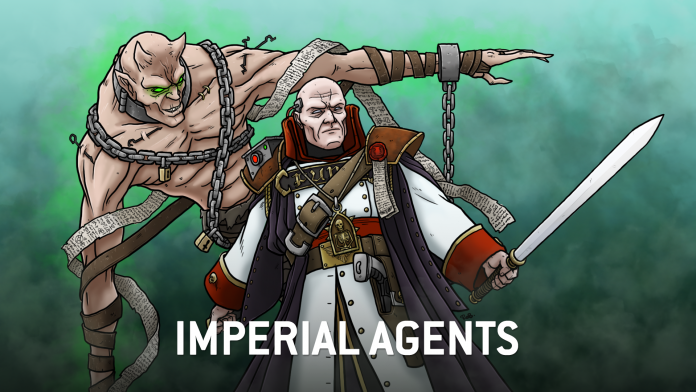Picked up a new Codex and a new Army, or revisiting an old force in a new edition? Welcome to Start Reading 40k, our guide to the best novels of the Black Library for each faction slugging it out in the Grim Dark Far Future. Each article will cover our top picks for reading about the armies you’re putting down on the table, so whether it’s inspiration, background or the deepest darkest lore secrets you’re after, we’ve got you covered. Let’s get reading!
The machinery of the Imperium isn’t managed and sustained by the Space Marines, Custodes or Astra Militarum. What keeps the galaxy-spanning terror of the Emperor’s realm from falling to Xenos predation, Chaos corruption or just plain religious Heresy is the tireless, unceasing and terrifying work of Agents of the Imperium – Inquisitors, Deathwatch, Grey Knights, Arbites, Ministorum Priests and Missionaries, Assassins and all the other assorted weirdoes strewn throughout the Galaxy. As an eclectic, exciting and just plain odd assortment of characters and groups, the Imperial Agents Codex provides one of the best ways to read some of the most interesting and flat-out best writing the Black Library has to offer. From high concept military scifi to gritty investigations in the back of beyond, Imperial Agents has something for everyone*, so let’s get reading.
We’ve reviewed, enjoyed and recommended a ton of Imperial Agents books before, so if you’re looking for something that isn’t here, go check out:
Arbites – King of the Spoil, Jonathan Beer
Imperial Navy – Outgunned, Denny Flowers
Inquisitors and Sisters – Our Martyred Lady, Gav Thorpe
Navigators – Rites of Passage, Mike Brooks
We’re going to presume you’ve either read, or want to read, the Eisenhorn series – Xenos, Hereticus and Malleus. Go read it. Go read Eisenhorn. It’s really good, though it does have some issues.
*Sisters and Grey Knights players will have to wait for their own articles, sorry!
Inquisitors: Pariah, Dan Abnett
Lost in the City of Queen Mab, Alizebeth Bequin is caught up in the machinations of rival Inquisitors with no idea of how and why, or even who she is. Bequin must learn the answers – and learn fast – after her previously comfortable world of the Maze Undue falls apart and thrusts her deep into a city at the end of everywhere, pursued by nightmare forces of impossible power.
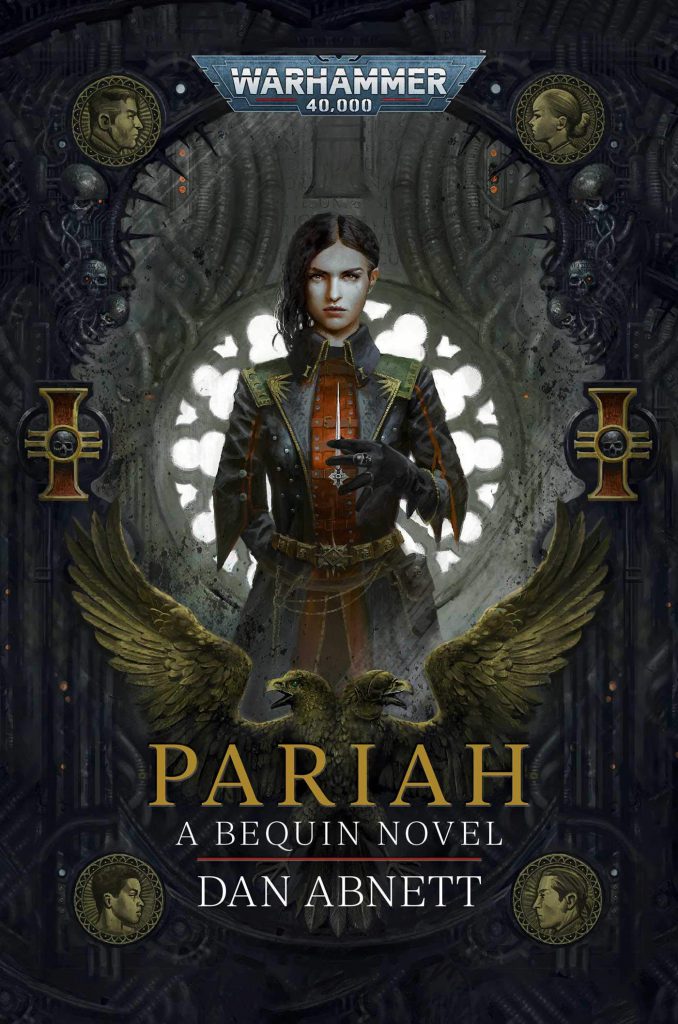
Why You Should Read It: Welllllllll, maybe you shouldn’t if you haven’t read the Eisenhorn and Ravenor series, but you should definitely read it because Pariah and the sequel, Penitent, are the best works in the Black Library. They’re the Imperium as it should be – baroque, gothic, terrifying, filled with out-of-context problems and dark magics. They showcase the Inquisition as an ouroboros of deceit and lies, an organisation as addicted to secrecy as it is to its self appointed mission as the ultimate guardians of the Imperium. It’s incredibly well-written and dripping in atmosphere, allowing Abnett to create one of the most enduring and lived in places in the 40k “canon” where everyone has an agenda and a role to play in whatever the hell he’s going to bring us with the long-awaited sequel. It’ll challenge you to think about 40k differently – it might even challenge you to read differently – and it’s worth every word.
Why is it a good Inquisition book: I think it’s the best book in the Black Library at showing the crazed machinations of the Inquisition, the plans within plans, the specialisation and variety of operations, the terror of the enemies they face and the ruthlessness with which they deal with them. At every turn, Alizebeth faces a new challenge and a new player in the game – most of them Inquisitors or Inquisition aligned. For a look at who they are and what they deal with you won’t find better.
What Inspirations You Can Take to the Table: For me it’s all about why your Inquisitor is there. You take a Marine Captain because they buff your units, but you’re not taking an Inquisitor for the 6+ invulnerable save. You’re taking them because if they weren’t there something terrible would happen. Something that Marines, or Guard, or even Custodes couldn’t handle. Something that can only be defeated by cunning, trickery, outright violence and plans to make the sanest chaos god go mad. Why is your Inquisitor on the table? I think you’ll find an answer here.
Rogue Traders: Void King, Marc Collins
Hark! Do ye yearn for a life of adventure on the high seas… except the watery depths be made from the endless void of space, the islands of buried treasure be planets with troves of forgotten archeotech, and the mighty kraken is, eh, Hive Fleet Kraken? Then it’s a Rogue Trader’s novel for ye, me lad! Take this salty voidsman’s advice: the first port on your voyage beyond the stars best be Void King by Marc Collins.
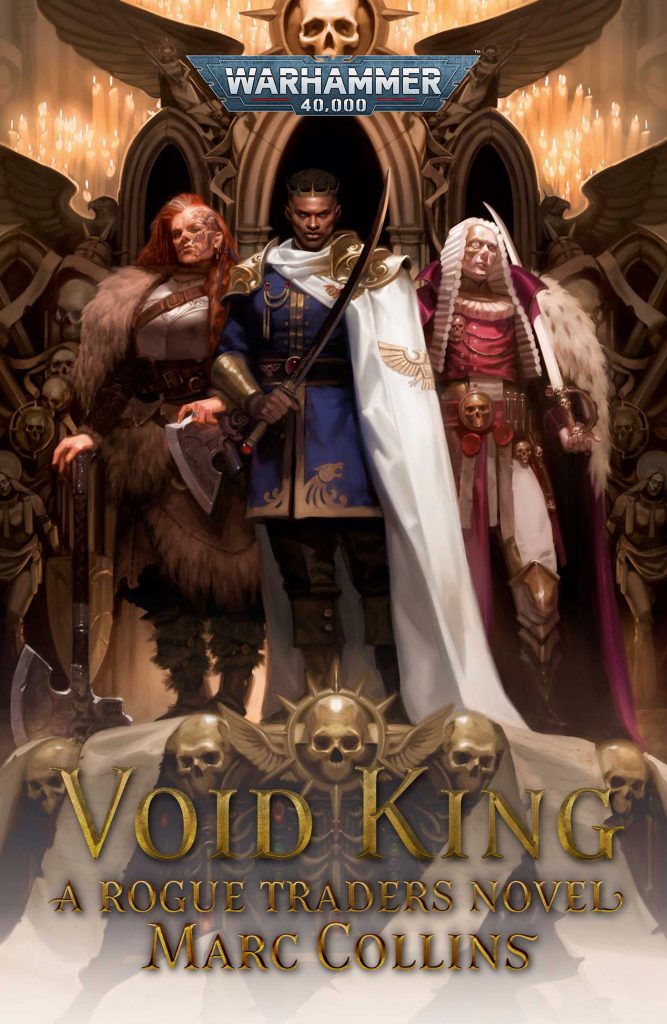
Fine, fine. No more pirate talk…
Void King tells the story of the Davamir Compact, a varied coalition of Rogue Trader houses held together by the titular Void King/Queen. In the era of the Indomitus Crusade, the houses gather after receiving word of the risen primarch, Roboute Guilliman. Erastus Lamertine, a scion of the current ruling house and son of the current Void King, must navigate a treacherous mystery. When betrayal strikes the Compact and pushes him to the fore, who can Erastus trust? It’s a story of intrigue and politics amongst the Emperor’s privateers that makes a great introduction to the world of Rogue Traders.
Why You Should Read It: Void King shares a lot of similarities to a good ‘popcorn flick’. There’s not a deep, mind-opening narrative worthy of a grand epic going on here. An unlikely leader finding themselves in a situation they didn’t want or prepare for, but rising to meet the challenges thrust upon them, is well-trodden territory. What makes Void King worth reading is how Marc Collins uses that familiar story as a foundation and then layers it with enough mystery, plot twists, and ‘rule of cool’ characters and set pieces to keep readers interested.
To fully elaborate on why moments in Void King feel like a blockbuster movie would require me to talk specifics… which would ruin most of the fun the book has to offer. So you’ll just have to trust me. Sometimes you’re better off with the teaser trailer alone. Void King probably won’t make anyone’s ‘Greatest 40k Novels of All Time’ list, but it’s solidly built and worth your time, particularly if you’re looking to learn more about Rogue Traders.
Why It’s a Good Agents of the Imperium Book: Rogue Traders are a faction in the lore that’s widely recognized, but rarely given focus in the novels (which is ironic, considering how central they were to the genesis of the setting). Void King puts them front and center, making for an excellent introduction to the faction.
It’s very easy to see the role Rogue Traders play and put them into a stock-standard materialist trope: The greedy, corrupt, selfish, capitalist underbelly of the Imperium. While many Rogue Traders certainly are that, Void King does a great job at showcasing a kind of Rogue Trader that feels much less explored. The Rogue Traders of the Davamir Compact aspire to higher purpose than material wealth, as outlined in the words of their first king:
‘We are sworn to Him. By bond of blood. By Letter of Marque, And Warrant of Trade. To claim the all-encompassing void, For sacred Mankind, in all her terrible wonder. To push further. To fight harder. To strive, not for glory alone. Not for empty plunder, nor hollow profit. We are the vanguard, a light in the black. Oath-sworn, solemn. We are the Davamir Compact.’
This grander view of their purpose really lends itself well to seeing them as part of the wider agents of the Imperium. Best of all, the uniqueness of Rogue Traders is kept intact, as each of the different ‘houses’ have an extremely diverse variety of appearances and philosophies. Which leads us neatly to…
What Inspirations You Can Take to the Table: One of the best things Rogue Traders offer to hobbyists is their individuality. As privateers, they tend to have strong individual aesthetics to spark your imagination and provide endless conversion and customization possibilities.
House Radrexxus is your window into the stereotypical decadent, foppish Rogue Trader, with extravagant armor and a bit of overfondness for ‘performance enhancing’ chemicals. Perhaps you’d prefer the more militaristically disciplined and diplomatic House Lamertine, the currently-appointed ruling house of the Compact. House Astraneus is essentially an Imperial death cult with the structure of a Rogue Trader house, perfectly suited to ally with the Ordo Malleus or Hereticus.
Looking for a flavorful take on Ordo Xenos agents? Look no further than House Helvintr. Tracing their origins to Fenris, Helvintr are the ‘barbarian’ hunters of the void whose specialty is taking down the biggest Tyranids they can find and hauling back their heads as trophies. Great for fans of vikings and Norse mythology looking for something beyond the Astartes-locked limitations of the Space Wolves. Void King is a veritable font of different aesthetics to pick and choose from to guide your hobby journey.
Assassins: Assassinorum Kingmaker, Robert Rath
A Vindicare, Callidus and a Vanus assassin walk into a bar. The barman takes one look at the trio and says: “You two assassins can stay but your Genestealer Hybrid friend will have to stay outside.” There were no survivors and no record that the bar ever existed. This joke is over. Do not ask any questions: Exitus Acta Probat.
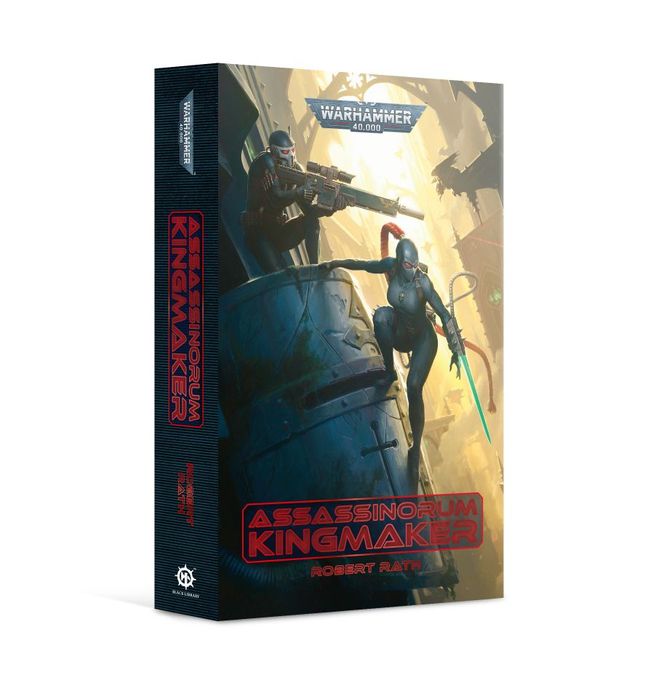
Assassinorum Kingmaker is a delightful heist film, where a plucky trio of Imperial Agents needs to steal a priceless treasure out from under an entire Court of Imperial Knights. Except it’s less stealing and more murder and it’s not actually a film at all, so I guess it’s less a heist film and more a murder book?
Why You Should Read It: I assume it’d be too lazy for me to say: ‘Because it’s a good book?’ [Ed: Yes, try harder.] This book gives us three protagonists with three completely different personalities and then puts them in conflict with each other almost as much as the actual enemy, which is a vastly more interesting proposition than the three characters presenting a united front.
The big ‘conundrum’ of the story: Working out how to assassinate their seemingly unkillable target is neatly presented and the book provides some novel solutions to it. It’s good fun watching them peel away the different layers of the puzzle.
There are a few twists and turns in the story that you might be able to predict if you put your mind to it but the author is pretty good at giving the reader just enough to set up the big reveals without giving them away too easily.
I think my favourite part of the book was when they took the handbrake off and went from ‘meticulously planned assassination’ to ‘Murder-Montage’ for a brief few pages. It was glorious. Though, I did find the idea that assassins, the peak of human conditioning and single-minded fanatics for the Imperial cause, both smoke and drink:
When the sleek groundcar pulled up with its top down, she hopped into the passenger seat rather than opening the door.
‘Good kill?’ Asked Raithe, his hand sheathed in soft driving gloves.
‘Good kill,’ Sycorax answered. ‘No pursuit’.
Raithe offered her a lho-stick, and when she took it she noticed it had already been clipped in half. ‘Why, Absolum. You don’t have an…’
Raithe clicked an igniter. ‘Koln said that’s your usual.’
This? This right here is why I made the joke earlier about this being a heist story. It’s almost James Bond levels of smirking at the audience and I’ll admit I’m kind of here for it.
There’s also some great Imperial Knights content in there. Ranging from the culture and politics of a Court through to some good old fashion heavy-metal mayhem. I wish I could say more about what happens involving the Knights but that would be spoilers.
Why It’s a Good Agents of the Inquisition Book: The book does a great job of selling us on the different methods and mindsets of Imperial Assassins, as well as the politics that surround their deployment. It’s great to read about the preparation and technical aspects of how Vindicares operate, ranging from their fieldcraft through to the ballistics calculations required to pull off those impossible shots. Reading about the process through which a Callidus assassin adopts and embraces their ‘role’, as well as details on how Polymorphine works is all really quite interesting.
Finally, as an assassin temple that doesn’t get much coverage on the tabletop, it was really cool to read about how the Vanus assassins perform their grisly work. Information warfare, hacking electronic systems as well as a cheeky spot of forgery is a great complement to the more direct methods of the Callidus and Vindicare temples.
What Inspirations You Can Take to the Table: There are some really inspiring scenes between the Vindicare and the Callidus doing their respective schticks. Really dynamic fight-scenes as well as some cool sniping moments. Read this book and you’ll be pretty keen to drop an Assassin into your next game.
That said, the Knights in this story get to pull off some rad stunts and get some great descriptions and flavour. Painting up an Armiger Warglaive or even something as majestic as a Knight Castellan/Valiant in the house colours of Rau or Stryder (or even as a Freeblade, you cheeky rogue).
Deathwatch: Deathwatch, Steve Parker
When a Marine is seconded to the Deathwatch, they exchange shockingly bright heraldry for steel and black, glorious tip-of-the-spear charges for covert ops, and glory in battle for the chance of satisfaction in a job well done. For some, the change is easier than others. For Talon Squad, a newly formed Kill Team soon to be sent out to purge a well-established Genestealer Cult, their new status as Deathwatch challenges everything they knew about warfare, the nature of the Astartes and the hierarchy of Founding chapters.
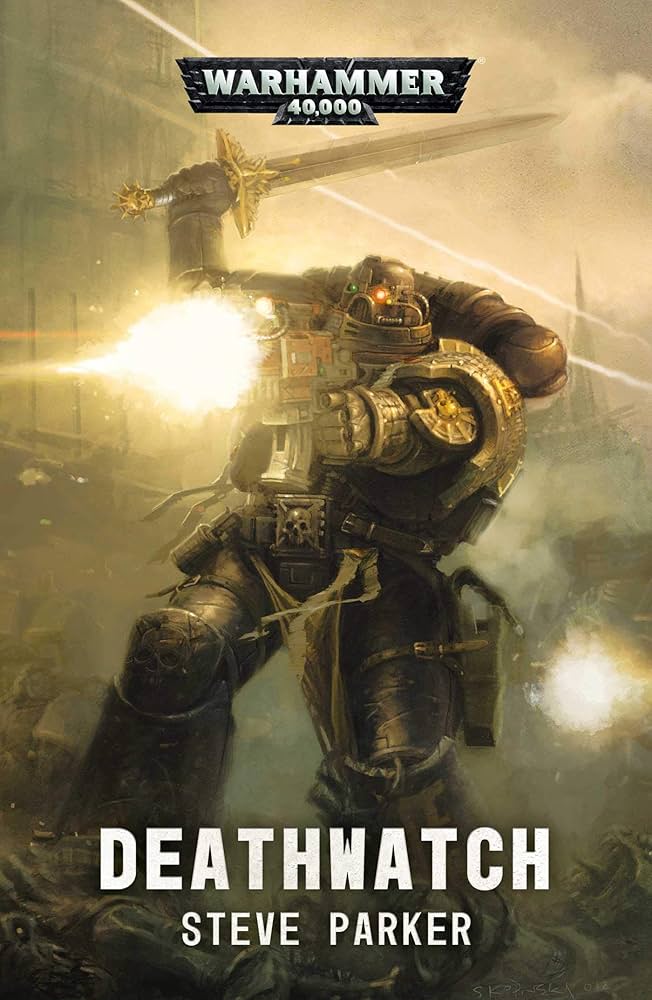
Why you should read it: The Deathwatch are weirdly under-served with Black Library offerings, which is odd because it’s such a good concept. Space Marines taken from multiple chapters, all with very different ways of doing things, have to band together, overcome differences and then get hurled into the worst situations the galaxy can possibly muster. The plots basically write themselves, right? In quite a few Deathwatch stories, yes, they do. Here, they don’t. Steve Parker puts a lot of effort into the setup, examining the shock of the secondment to the Deathwatch and the cultural differences between Space Marines in a way that’s both interesting and fun. It reads a bit like a 40k SAS memoir, one of those shovelware ghostwritten trash books that came out after the Gulf War, but is much, much more fun. It could be terrible, but it isn’t – Parker has an alternating light and heavy touch with the “These Marines are so different!” that never runs out of steam.
The fighting is intense and kinetic, with the horror of the Genestealer Cult done extremely well (and disgustingly). It gets a little bolter-porny towards the end, but with everything set up for the big fight to go down, none of that outstays it’s welcome. My only issue with it is that every single female character gets horribly murdered – unusually for the Black Library there’s quite a few though, which at least acknowledges that the Universe is larger than just manly men, though the constant fridging is unfortunate.
Why It’s a Good Agents of the Imperium Book: It’s not just Deathwatch. There’s lots of Inquisitorial agent investigation which is equally important to the overall plot and generally drips with grimdark terror. If the Deathwatch are the scalpel blade of the Ordo Xenos, someone has to, you know, point out where the scalpel should go, and that’s unpleasant, tough work. The book really gets across how this segment of the Agents of the Imperium works – Inquisitorial agents find things out, Deathwatch execute, Inquisitors scheme. If you want the two-fer of Inquisition shenanigans and black-clad marines shooting the shit out of aliens, here it is. }
What Inspirations You Can Take to the Table: If a Deathwatch Kill-Team is loads of chapters mixed together, how do you show that? It’s usually a headswap and some paint on a shoulderpad. That’s cool! There’s lots of that here to inspire, whether through relatively unknown chapters like the Exorcists or Death Spectres or in First Founding characters. But what if you could go a little further? Inventing chapters and fleshing them out before adding that heraldry – that’s here, with Parker really diving into the Death Spectres and how they function before turning that on its head in the Kill Team. You could even work on something that ties all your Kill Team Marines together, maybe something showing their veteran status, experience of working together or complementary pairings. What changes in a Marine when they join the Deathwatch? How can you show that in your modelling?
Have any questions or feedback? Drop us a note in the comments below or email us at contact@goonhammer.com. Want articles like this linked in your inbox every Monday morning? Sign up for our newsletter. And don’t forget that you can support us on Patreon for backer rewards like early video content, Administratum access, an ad-free experience on our website and more.
